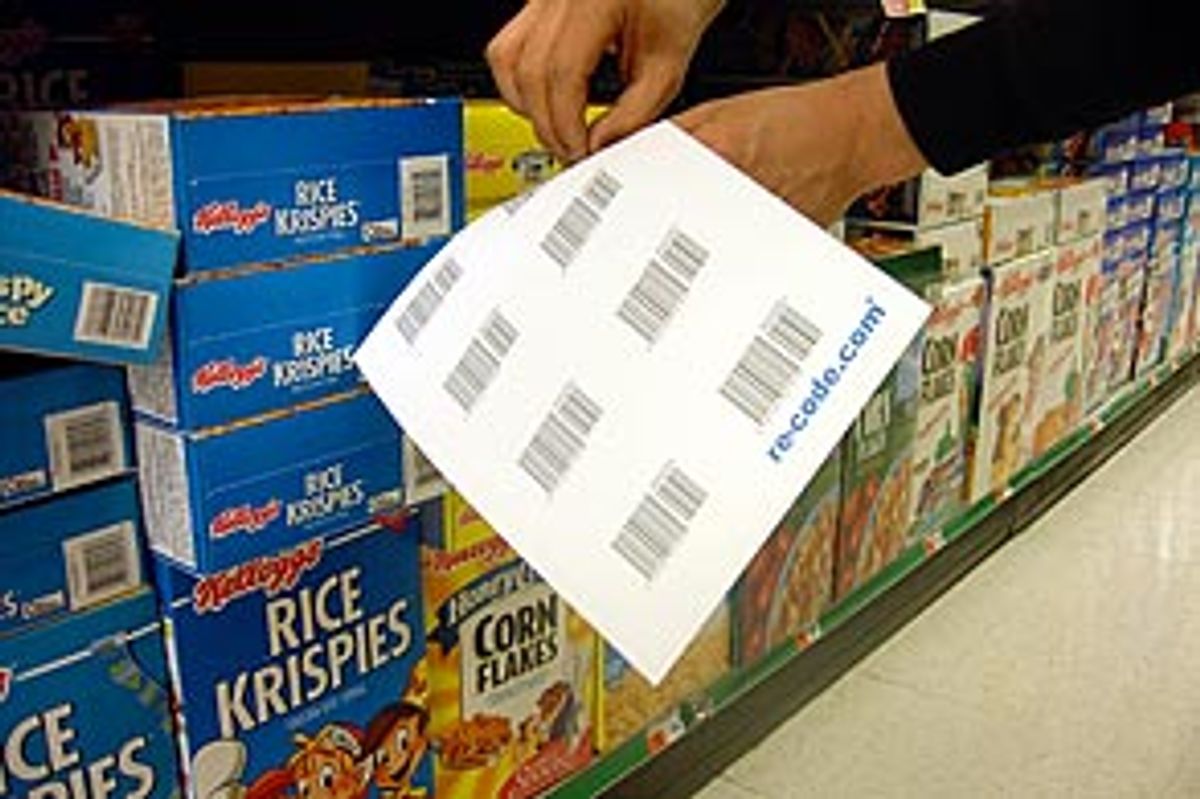Is it social commentary, or shoplifting?
The Web site Re-Code.com parodies the design and chipper lingo of Priceline.com's "name your own price" shopping site. It invites shoppers to "recode your own price," by making their own barcodes using the site's barcode generator. The theory: There's just a 10-digit number standing between you and a better deal on anything that you want in a store, and this site will help you crack the code.
The site's creators call it satire. Wal-Mart's legal counsel calls it an incitement to theft and fraud.
Re-Code.com lets shoppers share barcode numbers from products they've purchased or search for codes entered by other visitors to make their own. So far, the site claims that it has collected about 150 codes. Barcode swapping, say the site's creators, is a way of subverting a chain's own inventory management system to really name your own price: "Apply the cheaper item's barcode to the more expensive item," the site instructs, then go to the checkout where: "Cashiers usually don't notice but machines never do."
Re-Code.com is a project of the Carbon Defense League, an artist and activist collective affiliated with the "tactical media network" Hactivist.com.
"Nathan Hactivist," the nom de guerre of one of the collective's operatives, who is based in upstate New York, says "We think of ourselves as a friend of Priceline.com, making good on their promises of naming your own price. We're carrying out their goal to its logical extreme." He sees the site as a commentary on the absurdity of a company, like Priceline, marketing itself as "giving the power to the consumer," and as a tool for making a political statement about the perceived differences between brand-name and generic products, organic-labeled and non-organic foods.
But just days after opening for non-business on the Web, Re-Code.com has run afoul, not of Priceline's legal council, but of Wal-Mart's, the retailing megalith and the U.S.'s largest private employer. Despite the legal disclaimers at the bottom of Re-Code's home page pledging that the site is not intended to be used for illegal ends, Wal-Mart wants it shut down.
On April 2, Janet F. Satterthwaite, a Washington trademark attorney representing Wal-Mart Stores Inc., sent a letter to Domains by Proxy, a service that the Carbon Defense League used to register the Re-Code.com domain name anonymously, demanding that the site be shut down within 48 hours. It accuses Re-Code.com of "encouraging and facilitating theft and fraud against Wal-Mart," noting that "Wal-Mart barcodes are specifically made available on this Web site."
Domains by Proxy responded on April 10 by "canceling our privacy service for that domain," says Justin Scholz, the company's spam and abuse administrator. But the site is still up, since Domains by Proxy does not control its hosting or domain name registration, just the anonymity of that registration. Wal-Mart's lawyer refused to comment on the matter, but the collective behind Re-Code has gone on the offensive.
They posted the text of the letter on their home page, and added a more elaborate disclaimer, which visitors must pass through to visit the site: "If you understand that Re-Code.com is a site of satire then you may enter. We are not liable for any misuse of the contents of this site."
Below the disclaimer appears a handy list of "tactical shopping options using Re-Code.com" with Wal-Mart products. It suggests barcode swaps as a way of commenting on the war in Iraq: "Option 3: If we are to believe the mainstream news, casualties are very few in the current war. Why not suggest that our military begin strategic Nerf strikes by replacing Winchester Light Target Load Ammunition (UPC ID 2089200442) with Nerf Ballistic Balls (UPC ID 7628161348). Ain't no war like a Nerf war."
"We thought we'd target Wal-Mart specifically, since they chose to target us," says Nathan Hactivist. He says the Carbon Defense League has sought legal advice from lawyers affiliated with RTMark, a kind of counter-culture artists' front organization that helped etoy.com fight the dot-com eToys.com in a protracted trademark battle (which etoy.com eventually won). And right now, they don't believe that Wal-Mart has a case: Are 10-digit barcode numbers intellectual property? And where's the proof that anyone has stolen anything from Wal-Mart stores with the help of the site?
"In my mind, this is similar to 'The Anarchist's Cookbook,'" Nathan Hactivist says. "If the argument is that we're facilitating theft, then they should be going after the people who invented the barcode, which is the thing that's making it easier to steal. All we're doing is creating a database of the barcodes that already exist on the products that we purchase."



Shares